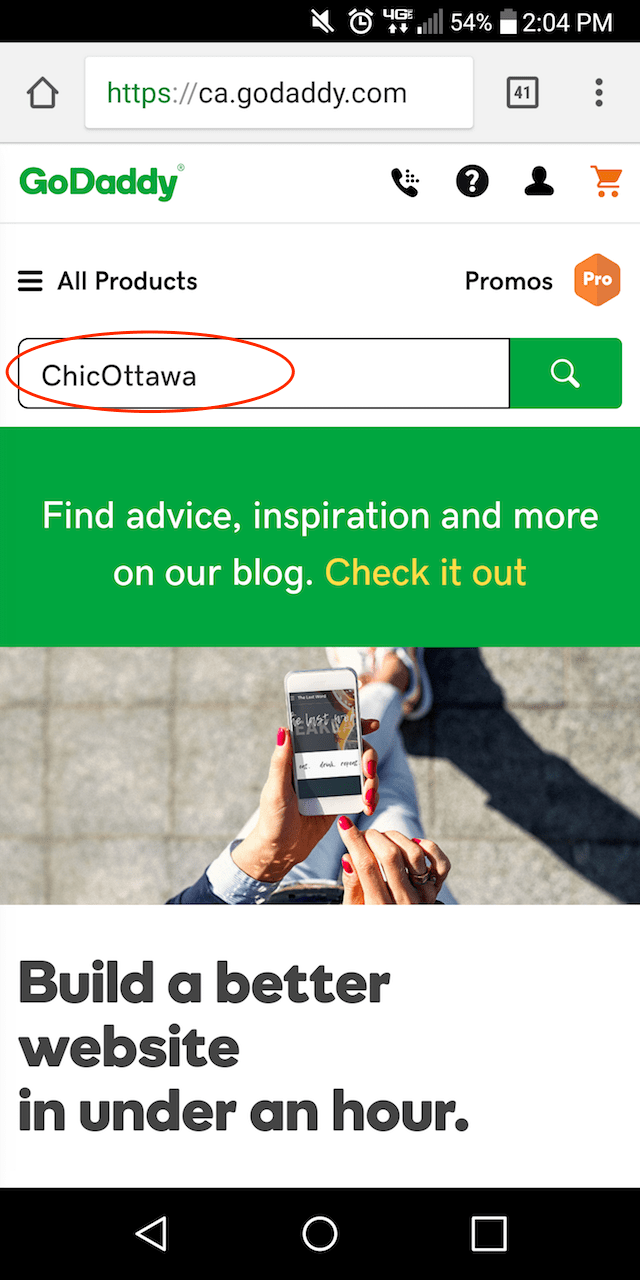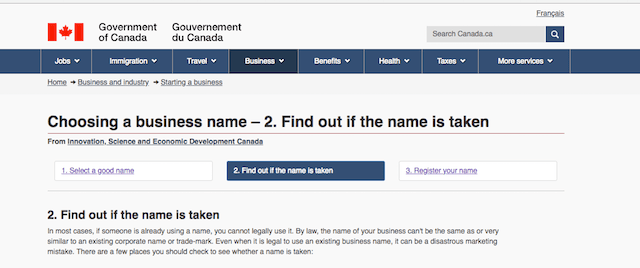Your business name is a big component of your brand and gives a first impression to new customers. When starting a new business, there are fewer decisions that create more pressure than landing on the perfect name. It’s kind of a big deal. This post will show you how to do a business name search and provide some tips on choosing.
If you’re working on getting your business off the ground, I’m assuming you fall into one of three categories:
- You have a name you’ve already got your heart set on and want to check to see what properties are available (including trademark, domain name, social media handles, etc).
- Your naming options are wide open and you can decide on a company name based on what is available.
- You’ve been buried in other aspects of your business and haven’t given it a thought until now (d’oh!) and are frantically searching the internet to find answers.
No matter which of these categories best describes your current situation, we’ve got some tips and resources to help you get your business operating under the great name it deserves.
Do a business name search in 4 steps
You’ve found the perfect name for your startup but need to know if anyone’s beaten you to it. Follow these steps.
-
Do a web search.
-
Check with the government of Canada.
-
Secure the online properties.
-
Register your business name.
Before we walk you through the process of getting a great name for your business, we’d like to offer a few tips.
General tips for choosing a business name
Let’s say you fall under category No. 2 or No. 3 — you don’t have a business name and are unsure of where to start. Here are some things to consider, useful for choosing both a business name and a domain name for your website.

Photo: Eduard Militaru on Unsplash
Identify your keywords
There are many businesses that are named after the product or service they provide and everything is working out perfectly fine for them (Canadian Tire and Mountain Equipment Co-op are two examples). But if you are stuck thinking of a business name, keywords are a great place to draw inspiration from.
Keywords are the words or phrases people type into a search engine when looking online for a product or service.
Tools like Google’s free Keyword Planner allow you to pick the global search engine’s brain and find out what terms your future customers are already using to search for your products or services. Just find a company that’s doing what you want to do and give Google their website address. Presto! You can see what terms people are typing in to find them. Use these terms as a starting point in your naming process. Find tips on using Google’s Keyword Planner here.
Include your business location
You could incorporate your location in your business name, using the city you operate in (e.g. Toronto or TO). Or if you want to appeal to Drake fans, add 6ix. This works particularly well for certain services. Just have a strategy in mind if you’re planning on scaling the business outside of your area.
Make it unique
Remember the episode of “The Office” where they order Pizza by Alfredo instead of Alfredo’s Pizza Cafe? Confusing your customers by naming your business something too similar to a competitor can have potentially devastating results. Especially when the stakes are as high as ordering pizza. You want your business to stand out with a unique, memorable name.
How to conduct a business name search in Canada
Once you have a name you’d like to use, one of the first things you should do is check to see if your desired business name is already in use. This will save you time, frustration and possible legal trouble down the road.
1. Do a web search
There are several things you can do, starting with a general search on the internet. You might want to check to see if there’s an alternative meaning or usage you’re not aware of — or a competitor who is already using the name you want.
Just because you have innocent intentions with your completely professional business name doesn’t mean that it doesn’t secretly mean something horrifying according to Urban Dictionary.
Best you do your research before you name your business.
2. Check with the government of Canada
You can also perform searches on provincial and federal databases — the Government of Canada goes over a few great tips and lists the links for these on their site.
3. Secure the online properties
Once you’ve found a business name that’s available, it’s a good idea to check the matching digital properties — the most important one being your domain name. A business domain name is an important consideration, as it will serve as the online hub of your business website and email address(es).
Related: Check out this post on using a domain name generator to get the best domain for your business.
Ideally, you want your domain name to match your business name.
It shows you’ve done your prep work and care about your business looking professional, which can be essential when gaining credibility as a new startup.
How to find out if a domain name is available
Domain names are unique; only one person has the right to use a particular domain name at any given time.
To find out if the one you want is available, simply type it into GoDaddy’s domain search box. If it’s available, you’ll have a few decisions to make, like which Top-Level Domain to go with (.ca is a great choice for Canadian businesses) and the length of time you wish to register it for.
Try it now!
What if the domain name you want isn’t available?
There’s always the chance that someone else has already registered the domain matching your desired business name. If you haven’t registered your business name yet, you might want to consider choosing a different name where both the business name and domain name are available.
If it’s too late for that, it really isn’t the end of the world. Here are a few options:
- Buy the domain name from the current owner. You might try to contact the domain owner yourself via the email address in our WHOIS domain lookup tool. GoDaddy also offers a Domain Broker Service that will contact the owner on your behalf. Once you've successfully purchased the domain, use domain transfer to move it to your GoDaddy account.
- Register an alternative domain. GoDaddy helps you with this by suggesting some available options — including cheaper domain alternatives — right on the domain search results page.
- The .ca registry offers a great resource, “The ultimate guide to choosing a domain name.” This downloadable eBook will help you find the one that’s right for you.
While you’re at it, you should check to see if the matching social media handles are available as well — even for the ones you don’t plan on using. This step is all about securing your business’s online real estate and presenting a consistent business image across all media.
 4. Register your business name
4. Register your business name
Now that you’re sure the name you want is available, along with the matching digital properties, it’s time to register your business name at the appropriate jurisdictional level. Some can complete this process online, while others should look forward to doing some good old fashioned paperwork! Find all you need here.
How you go about registering your business name boils down to two things:
Your business structure
Whether you need to register your business name or not depends on the type of business you choose to operate:
- Sole proprietorship
- Partnership
- Corporation
- Co-operative
If you’re operating a sole proprietorship under your personal name, you generally do not need to register it. Lucky you! However, if you want your sole proprietorship to have a trade name instead of using your personal name, you will need to register it.
If you choose partnership, corporation or co-op for your structure, you will definitely need to register your business name with the Canadian government.
Registering at the provincial or federal level
If you are planning on incorporating your business, you can register it at either a provincial or federal level. If you plan to operate in more than one province, you should look into incorporating and registering your business name federally.
Things to remember
Step one is to come up with a list of good business names based on things like keywords, your location and potential business growth. Then do a business name search using your provincial or federal website. Next, check to see if the matching digital properties — such as domain name and social media handles — are available. Then register your business name (and domain) and celebrate, knowing your brand is ready to roll. Here’s to many successful years ahead!







